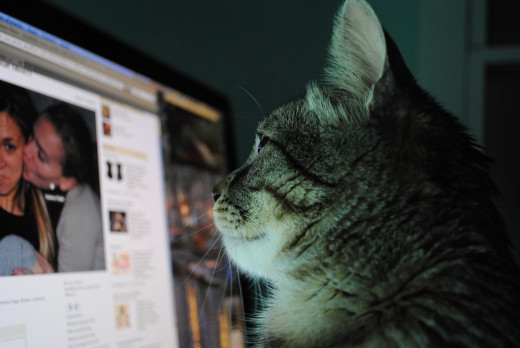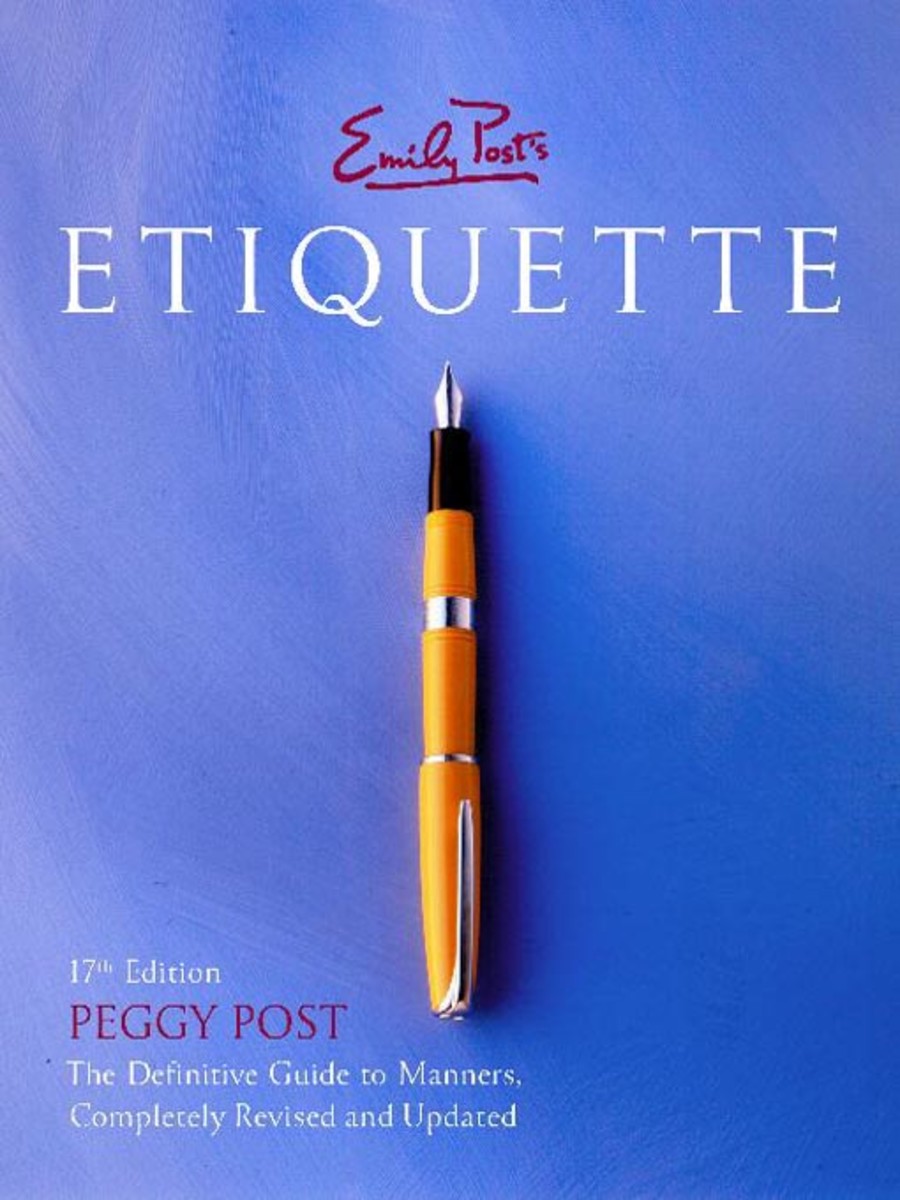Why Netiquette is crucial - how we can observe good internet manners


Netiquette - or manners long forgotten! Having created numerous Facebook groups for teenage students, I am increasingly alarmed at how manners are being neglected in Cyberspace - students hack into the Facebook accounts of others, mine included, read posts and comment on them liberally. When I say liberally, take that word literally - some of the words and phrases used are far less than appropriate. Implementing disciplinary measures was an unenviable task.
Bad social graces in cyberspace seem more allowable because communication with other parties is far more distant - we hardly meet them in person. The threat of proximity is removed - giving the seeming license to speak as freely as desired. The tendency to forget that the other person at the other end of Cyberspace is real and with feelings is extremely high. Yet, they ARE real - and we should therefore do unto them what we want to be done unto ourselves.

How to follow proper netiquette rules
How should we practice good netiquette?
Netiquette is a fairly new concept - one developed since point-to-point communication between computers started taking place when they were developed in the 1950s and 60s.
In the 1980s and 90’s, Cyberspace took the world by storm - the first ISP providers began to make their presence felt. Long-range communication soon became so much easier - and knowing that, we should be mindful that the person on the other end of the Cyberline should be treated with due decorum. So how do we show that respect?
Be cyber aware.
This can be difficult to practice, especially if one is new to a particular site or domain. Take the time to observe and ask about the rules governing that site or domain - be aware that the little things you do may not be acceptable behaviours where that site is concerned. It may be perfectly alright to post many Twitter Feeds, for example, but it would be considered bad taste to do so on Tumblr or Reddit. Doing so may cause you to be Knighted, dubiously with Spammerhood. Good net manners become the order of the day.
Be aware too, of the posts you are writing. It takes time and patience with yourself and others, but try as best as possible to remember that what is written online is permanently recorded. People have varied interpretations of any remarks that are being made online and we never know when any of them can cause animosity.
Respect Net Privacy.
Respecting Net Privacy can apply to anything online as well as off it. Online, it is really atrocious net manners to break into another person’s Facebook or other accounts and start reading or making remarks on their posts. I have had students who have done so on many occasions to their friends and on one unfortunate occasion, to myself and it was annoying, to say the least.
Offline, do respect boundaries - it is an unwritten rule but respect your family member’s or colleagues’ email privacy. It is in really bad taste to read another person’s mail as well - I did on one or two unfortunate occasions catch a colleague peeking surreptitiously at my computer, quickly hiding away on realizing that he had been discovered. It is not only bad manners, legal issues with encroaching on privacy and harassment can result.
Remember that the person on the other end of Cyberspace is human.
The wonders of modern technology have made it possible for all of us to interact globally, almost 24 hours a day. The feeling can be understandably surreal since we do not have the pleasure of meeting offline. The lack of presence can make the interaction seem too easygoing and give rise to the feeling that the words being posted do not really matter.
I cite an example of how a young man in Singapore, a university undergraduate in his twenties, was recently given a rather hefty fine for making racial slurs - unbelievably, his excuse was that he did not think the other person would take note of the post or be offended. The fact is, we can offend online - so we need to be wary when being too free with our opinions.
Observe the same social graces you would when you meet people in person.
All of us have been brought up by our loving parents to observe social graces when meeting relatives and friends - so there is no reason to neglect them online. Greet the people whom you meet online with respect and decorum - there is no need to exaggerate with a Good Day Mr or Mrs So and So, but do wish them a good morning when you see them or thank them when there is a need. Remember that the person over at the other end has feelings - he wishes to have the same amount of respect you would.
Do not abuse your power.
Being in certain positions online can put you in a greater position of authority - as the creator of social media groups or site administrators, for example. Site administrators have the authority to delete posts. If they have added programming or networking skills, they can use them to block or create malware that affects another less knowledgeable fellow site member.
The abuse of such advantages speaks of a lack of integrity - and amounts to cyberbullying!
Respect another person’s cyberspace.
Do respect another person’s cyberspace - do not invade it. It includes keeping people who do not need to be included off mailing lists. I share a small incident which involved a couple of my colleagues who were involved in organizing a workshop - and he included, as a measure of convenience, the emails of all members of a group. As a result, all our emails were flooded for days with “Please Do Not Include Me In This Mailing List.” My colleague, needless to say, received several sharp scoldings. Do not include indiscriminately - the other person may not appreciate his email box being constantly flooded.
Remember, too, that we are not the centres of cyberspace - in this day and age, we expect our responses to emails and posts to be almost instantaneous. In actual fact - responding to posts and emails takes a much-needed but not readily available ingredient - time!

What is netiquette and why is it important?
Prevent flaming - be an arbitrator!
Flaming refers to deliberately making another person appear horrible or the subject of scandal online. Usually, this happens in groups, with many getting together to give a single party a difficult time. Mob mentality is something that is to be feared. Teaching youth has revealed to me that it can really frighten you when people get together in a group to exert pressure on another person. The effects can be damaging - and even more pronounced if the flaming is prevalent online.
It has caused suicide - teens flaming teens has terrible social repercussions. One just has just to google to find stories of countless victims. A student of mine was once the subject of teasing online when she foolishly declared that she had developed a crush on a boy - soon, the whole class and Facebook Group knew about it and the poor student was soon Missing In Action from school. She had even attempted jumping off the school’s roof and was lucky to have been discovered in time.
Be an arbitrator of flaming - I have had to be in this position many times. Check remarks and encourage people to be reasonable with them - from experience, they do not stop immediately but do quiet down at a quicker rate.
Check your appearance!
For writers like ourselves, this can be vital. Look good online - and no, this does not refer to a gorgeous avatar. What I refer to are grammatical mistakes and spelling errors - too many of them can indeed spoil the internet broth.
It is giving proper respect to the other person online reading your work when you make the effort to eradicate spelling and grammar errors - it gives a better impression and gives a person more credibility when he is posting.
Pause before you post.
It is difficult, in the rush of time, to really think about the things that we are posting and writing. It is even more difficult to for see the ramifications our words can have on the feelings of others - our comments are open to all kinds of interpretations.
I try - though I am definitely not perfect at it - to practice the rule of spending a minute to think before I comment on anything - and if I do not have anything nice to post, I would rather not at all.
Follow those who follow you…but use discretion.
It is the polite thing to do to click the follow button on someone who has added us to their Pinterest Lists or Facebook Friends.In fact, from the point of view of Netiquette, it is only right to do so. But do be careful - adding that other person may result in you being cyber stalked or bullied.
I have a friend who is beautiful to say the least and is somewhat of a social butterfly - the number of friends she has online makes my friend’s list look minuscule. She encountered, eventually, a young man online who would not leave her alone - and she was forced to abandon the social media site she was using.
Since then, though, she has been happily making friends with a little more discretion - and very good ones!
Not all places observe the same netiquette!
What is perfectly acceptable in one domain may not be so in another. When you first join a domain or social media site, hang around and watch what others are doing - If you notice a trend in the type of posts being made, do post things only of the same veneer. For example, it may be acceptable to post silly messages on one site on Facebook - it can be social to do so - but it may not be acceptable in other domains.
Every site and page may have its rules, written or unwritten. Do ask whenever in doubt!
Share and share alike!
The advent of the internet has made it possible for all of us to share knowledge almost all the time. It is only polite to share your knowledge and skills with the next person, who should share his in return. Everybody has a set of skills - exchange yours, do not guard them too selfishly and everyone is the richer for it.
The problem comes when everyone sees themselves as the centre of Cyberspace - they keep a lot to themselves. Encourage the spirit of sharing - it is only polite over the internet.
Forgive others for their mistakes.
Be forgiving - especially if you are a site administrator managing newbies who are not sure of the rules when they first join your site. Be patient when teaching them these rules - they may flout them unknowingly, so let them in on the rules gently.
A member may not realize that it is not right on your site to post anything other than site related material - so it is good to share this fact with him. Monitor his behavior - if he still persists in flouting the rules, it is a sign of his tardiness and he should then be removed from the group.
The importance of Netiquette can never be undermined - we need it for survival in the Cyber World. I do notice that the word Netiquette is not treated as a spelling error on Microsoft Word as I write this article - it is really telling!

This content is accurate and true to the best of the author’s knowledge and is not meant to substitute for formal and individualized advice from a qualified professional.
© 2012 Michelle Liew







